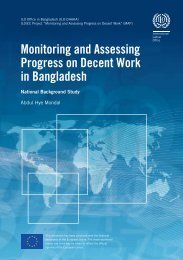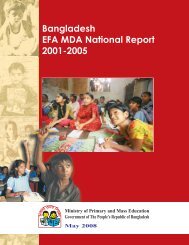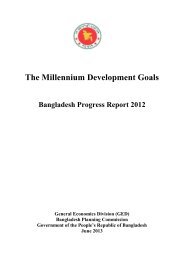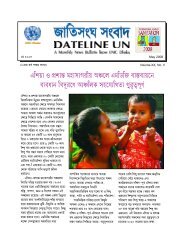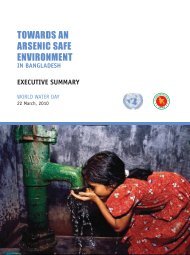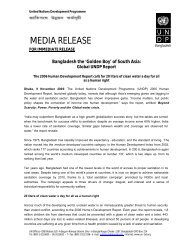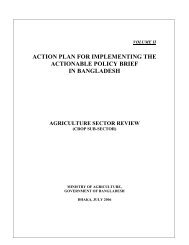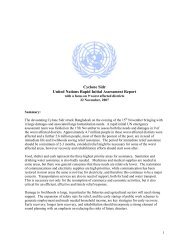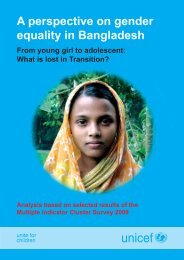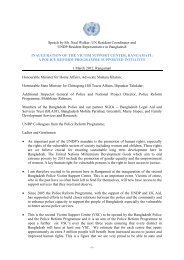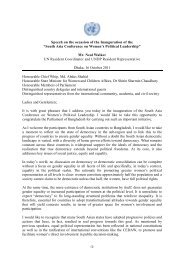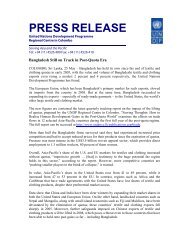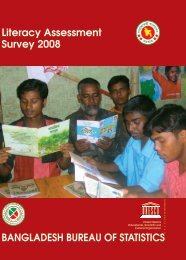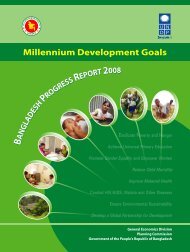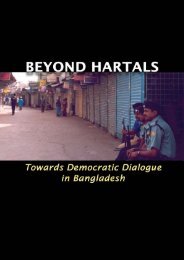Database - United Nations in Bangladesh
Database - United Nations in Bangladesh
Database - United Nations in Bangladesh
You also want an ePaper? Increase the reach of your titles
YUMPU automatically turns print PDFs into web optimized ePapers that Google loves.
Preface<br />
Environment today is recognized as an important element <strong>in</strong> development. One critical aspect <strong>in</strong> this l<strong>in</strong>k that is often<br />
overlooked concerns the ma<strong>in</strong>stream<strong>in</strong>g of people's perception and their role <strong>in</strong> the management of the environment.<br />
The People's Report on <strong>Bangladesh</strong> Environment is an attempt at present<strong>in</strong>g people's perception about the<br />
environment around them <strong>in</strong> a comprehensive manner.<br />
The question can be raised as to why another report on the environment when scores of reports abound. We<br />
acknowledge that there are reports, many reports. Our premise is that there is no report reflect<strong>in</strong>g ord<strong>in</strong>ary citizen's<br />
perception of the environment. Although the issue of people's participation has almost become a cliche, this concept<br />
has not been effectively implemented <strong>in</strong> many areas. We strongly feel that the issue of environment has become so<br />
pervasive that it cannot be left only to scholars and policy makers. This is an issue which is <strong>in</strong>timately related to people's<br />
liv<strong>in</strong>g, livelihood and <strong>in</strong>deed their rights, their aspirations for quality governance and equity; their heroic struggle for<br />
survival with dignity and creativity. We, therefore, felt that there should be an honest attempt at captur<strong>in</strong>g people's<br />
perception on environment and their views and suggestions for f<strong>in</strong>d<strong>in</strong>g creative solutions for improv<strong>in</strong>g their livelihoods.<br />
This report is a modest attempt at represent<strong>in</strong>g perceptions of common people regard<strong>in</strong>g environmental and<br />
ecological issues that impact their lives <strong>in</strong> a multitude of ways. We have done this <strong>in</strong> an effort to ma<strong>in</strong>stream ord<strong>in</strong>ary<br />
citizens' <strong>in</strong>puts <strong>in</strong>to the decision-mak<strong>in</strong>g process on environmental management. We are conv<strong>in</strong>ced that without the<br />
<strong>in</strong>volvement of citizens at large any attempt at improv<strong>in</strong>g the environment around them will not be susta<strong>in</strong>able. They<br />
are the users, beneficiaries, victims and saviours of the environment. So they deserve to be the primary stake holders<br />
<strong>in</strong> any attempt at environmental regeneration.<br />
Unnayan Shamannay has always emphasized the pr<strong>in</strong>ciple of "people first" and our mission is people-centred. As a<br />
research organization, its endeavour however is to project the people's perspective, without compromis<strong>in</strong>g on scientific<br />
accuracy or academic rigour. The People's Report on the <strong>Bangladesh</strong> environment is yet another attempt at fulfill<strong>in</strong>g<br />
our mission. The first People's Report (for the year 2001) was well received. Readers provided us useful feedback,<br />
comments and observations to further improve the content and presentation of the Report. We have done our best <strong>in</strong><br />
<strong>in</strong>corporat<strong>in</strong>g their valued suggestions. The second People's Report, primarily for the year 2002, also uses 2003<br />
sources and data because of its later publication date. This has made the Report more enriched and updated.<br />
Hopefully, it will also be appreciated by our esteemed readers.<br />
The ma<strong>in</strong> focus of this edition of the Report is on the state of the urban environment and spans the broad panorama<br />
of the urbanization cont<strong>in</strong>uum. Issues covered <strong>in</strong>clude poverty and marg<strong>in</strong>alization, population, health and nutrition,<br />
<strong>in</strong>dustrialization, energy etc. It also covers related issues such as land and agriculture, forestry and bio-diversity, water<br />
and climate. The Report consists of two volumes. Volume I presents people's perception, survey f<strong>in</strong>d<strong>in</strong>gs and experts'<br />
views on environmental issues, development policies and directions. Volume II provides correspond<strong>in</strong>g database on<br />
different aspects of <strong>Bangladesh</strong> environment. We have used quotations (<strong>in</strong> English translation) from several dist<strong>in</strong>guished<br />
Bengali poets at the beg<strong>in</strong>n<strong>in</strong>g of each chapter to <strong>in</strong>troduce or embellish the theme. The poets quoted are: Jibananda<br />
Das, Kazi Nazrul Islam, Rab<strong>in</strong>dranath Tagore, Rafique Azad and Shamsur Rahman.<br />
This report is the outcome of a team work. Many experts, ord<strong>in</strong>ary citizens and, of course, our <strong>in</strong>-house team of<br />
Unnayan Shamannay have been deeply <strong>in</strong>volved <strong>in</strong> this challeng<strong>in</strong>g work. My s<strong>in</strong>cerest gratitude to the ord<strong>in</strong>ary<br />
people who have shared their valuable <strong>in</strong>sights with our research team on the environment around them. This report<br />
could not have materialized without the tireless efforts of our local associates and research officers, especially Rahela<br />
Rabbani, Tahm<strong>in</strong>a Sultana, Novera Hossa<strong>in</strong>, Hamim Kamrul Haque, M. Anowar Hossa<strong>in</strong> and Riaz Udd<strong>in</strong>. I am<br />
particularly grateful to Dr. M Ashraf Ali, Department of Civil Eng<strong>in</strong>eer<strong>in</strong>g, BUET and Farooque Chowdhury of Unnayan<br />
Shamannay for their coord<strong>in</strong>at<strong>in</strong>g role <strong>in</strong> this enterprise. I am equally grateful to Mahboob Hassan for his excellent<br />
technical edit<strong>in</strong>g. Last but not least I wish to thank the experts for their sterl<strong>in</strong>g contributions, which have provided a<br />
comprehensive perspective on the issues. Iffat Mahmud and Ejaj Ahmad deserve special thanks for their edit<strong>in</strong>g skills.<br />
Mijarul Quayes deserves my appreciation for his editorial contribution. Dr. Babar Kabir, Project Coord<strong>in</strong>ator, and<br />
Mr. Ch<strong>in</strong>moy Mutsuddi, Communication Specialist, PMU, SEMP have always been a source of encouragement and<br />
support throughout the entire period of preparation of this Report.<br />
I must thank the M<strong>in</strong>istry of Environment and Forest (MoEF), Government of <strong>Bangladesh</strong> and the <strong>United</strong> <strong>Nations</strong><br />
Development Programme (UNDP) for their generous support for this work. In particular, I must thank Dr. Shoaib Ahmed,<br />
Secretary, M<strong>in</strong>istry of Environment and Forest and National Project Director, SEMP, Mr. Jorgen Lissner, Resident<br />
Representative, Ms. Shireen Kamal Sayeed, Assistant Resident Representative of UNDP for their cont<strong>in</strong>ued support.<br />
Atiur Rahman<br />
Chair, Unnayan Shamannay



